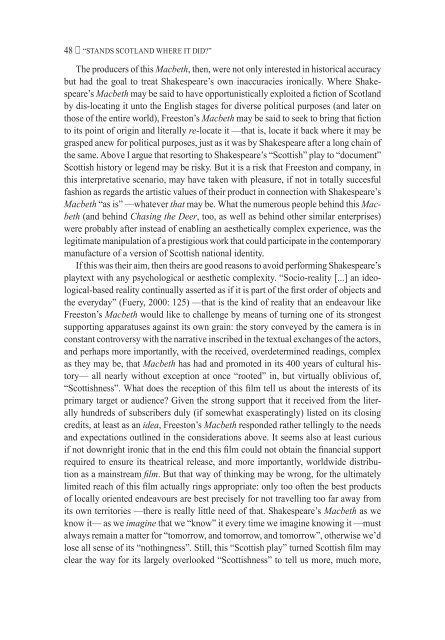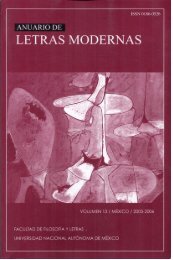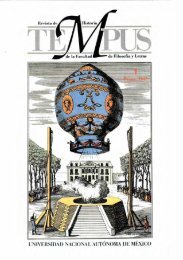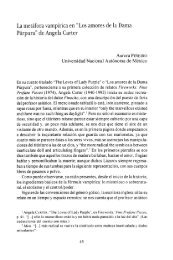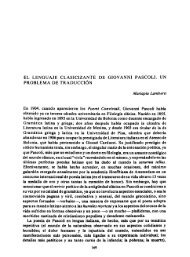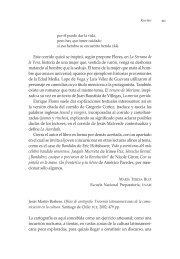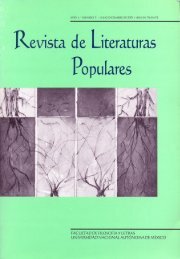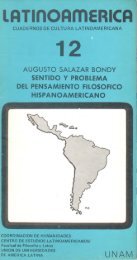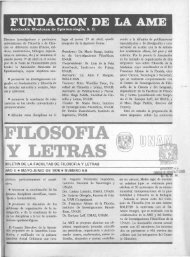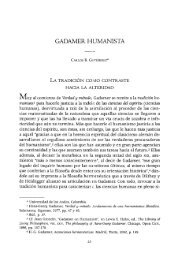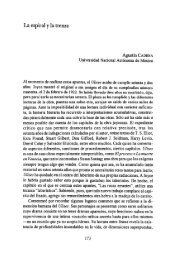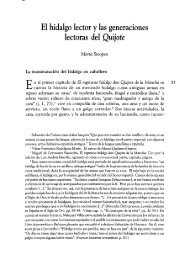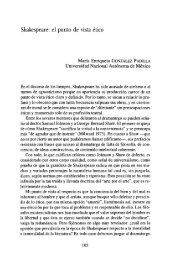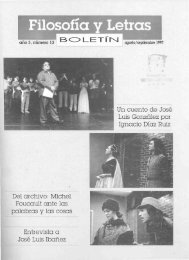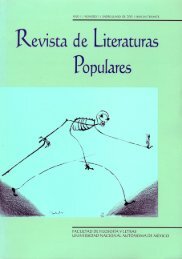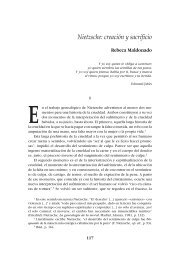Untitled - Repositorio de la Facultad de Filosofía y Letras. UNAM ...
Untitled - Repositorio de la Facultad de Filosofía y Letras. UNAM ...
Untitled - Repositorio de la Facultad de Filosofía y Letras. UNAM ...
You also want an ePaper? Increase the reach of your titles
YUMPU automatically turns print PDFs into web optimized ePapers that Google loves.
48 “StANdS ScOtlANd Where It dId?”<br />
The producers of this Macbeth, then, were not only interested in historical accuracy<br />
but had the goal to treat Shakespeare’s own inaccuracies ironically. Where Shakespeare’s<br />
Macbeth may be said to have opportunistically exploited a fiction of Scot<strong>la</strong>nd<br />
by dis-locating it unto the English stages for diverse political purposes (and <strong>la</strong>ter on<br />
those of the entire world), Freeston’s Macbeth may be said to seek to bring that fiction<br />
to its point of origin and literally re-locate it —that is, locate it back where it may be<br />
grasped anew for political purposes, just as it was by Shakespeare after a long chain of<br />
the same. Above I argue that resorting to Shakespeare’s “Scottish” p<strong>la</strong>y to “document”<br />
Scottish history or legend may be risky. But it is a risk that Freeston and company, in<br />
this interpretative scenario, may have taken with pleasure, if not in totally succesful<br />
fashion as regards the artistic values of their product in connection with Shakespeare’s<br />
Macbeth “as is” —whatever that may be. What the numerous people behind this Macbeth<br />
(and behind Chasing the Deer, too, as well as behind other simi<strong>la</strong>r enterprises)<br />
were probably after instead of enabling an aesthetically complex experience, was the<br />
legitimate manipu<strong>la</strong>tion of a prestigious work that could participate in the contemporary<br />
manufacture of a version of Scottish national i<strong>de</strong>ntity.<br />
If this was their aim, then theirs are good reasons to avoid performing Shakespeare’s<br />
p<strong>la</strong>ytext with any psychological or aesthetic complexity. “Socio-reality [...] an i<strong>de</strong>ological-based<br />
reality continually asserted as if it is part of the first or<strong>de</strong>r of objects and<br />
the everyday” (Fuery, 2000: 125) —that is the kind of reality that an en<strong>de</strong>avour like<br />
Freeston’s Macbeth would like to challenge by means of turning one of its strongest<br />
supporting apparatuses against its own grain: the story conveyed by the camera is in<br />
constant controversy with the narrative inscribed in the textual exchanges of the actors,<br />
and perhaps more importantly, with the received, over<strong>de</strong>termined readings, complex<br />
as they may be, that Macbeth has had and promoted in its 400 years of cultural history—<br />
all nearly without exception at once “rooted” in, but virtually oblivious of,<br />
“Scottishness”. What does the reception of this film tell us about the interests of its<br />
primary target or audience? Given the strong support that it received from the literally<br />
hundreds of subscribers duly (if somewhat exasperatingly) listed on its closing<br />
credits, at least as an i<strong>de</strong>a, Freeston’s Macbeth respon<strong>de</strong>d rather tellingly to the needs<br />
and expectations outlined in the consi<strong>de</strong>rations above. It seems also at least curious<br />
if not downright ironic that in the end this film could not obtain the financial support<br />
required to ensure its theatrical release, and more importantly, worldwi<strong>de</strong> distribution<br />
as a mainstream film. But that way of thinking may be wrong, for the ultimately<br />
limited reach of this film actually rings appropriate: only too often the best products<br />
of locally oriented en<strong>de</strong>avours are best precisely for not travelling too far away from<br />
its own territories —there is really little need of that. Shakespeare’s Macbeth as we<br />
know it— as we imagine that we “know” it every time we imagine knowing it —must<br />
always remain a matter for “tomorrow, and tomorrow, and tomorrow”, otherwise we’d<br />
lose all sense of its “nothingness”. Still, this “Scottish p<strong>la</strong>y” turned Scottish film may<br />
clear the way for its <strong>la</strong>rgely overlooked “Scottishness” to tell us more, much more,


